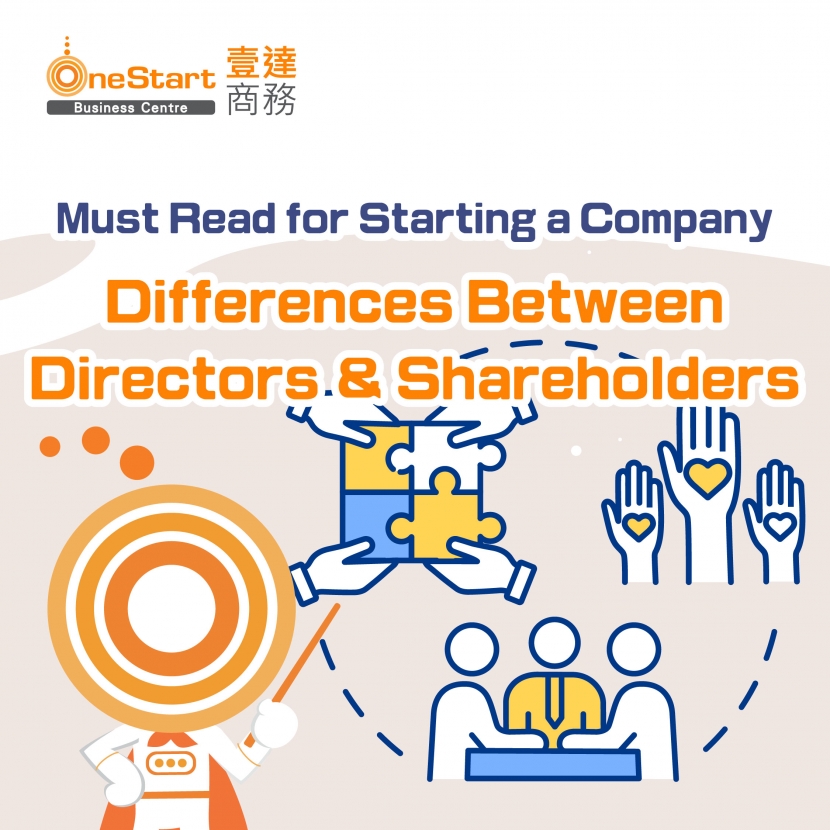Starting a company involves not only brainstorming the brand but also choosing the right people to be in charge, with directors and shareholders being the most frequently seen figures. What is the difference between them? In this article, we will briefly explain their rights and responsibilities, so that you can understand the status and duties of directors and shareholders.

What are shareholders?
Shareholders are the owners of a company limited by shares, who provide funds, resources and technology to the company in exchange for shares, and are therefore also corporate investors. Under Hong Kong’s regulation, every Hong Kong registered limited company must have at least one shareholder. Many company founders are also major shareholders of the company, thereby acquiring majority ownership of the company.
Shareholders are also known as stockholders. Each share certificate is a proof of share ownership, which allows shareholders aka investors to obtain dividends. At the initial stage of starting a business, it is necessary to decide on the ratio of shares between shareholders, the number of issued shares and the amount of shares. In the future, transfer of shares might also happen to cope with the company’s development.
Who can become a shareholder?
Any person over the age of 18, including non-Hong Kong residents may be a shareholder; a shareholder can also be a director.
Rights of shareholders
Although shareholders are the owners of a company, their primary responsibility is not to manage the day-to-day operations and direction of the brand. Shareholders have the right to receive dividends, to alter the registered share capital, to change the name of the company, to amend the articles of association, to attend annual and special general meetings of the company, to propose the convening of a general meeting, to vote at a general meeting, and to appoint or remove directors.
In addition, if the company is dissolved and all expenses are paid, the shareholders are entitled to the remaining assets. Shareholders can also request access to financial statements, directors' report and audit reports to keep track of the company's latest state of affairs.
Liability of shareholders
Since a limited company has the status of an independent legal entity, the liability of the shareholders is limited. Shareholders are only liable for the amount of shares paid by them, whereas the debts of the company are the responsibility of the company itself, and creditors do not have the right to recover the debts from the shareholders.
What are directors?
Directors are the senior management and operators of a company and have the authority to make decisions about the company's direction and day-to-day dealings. Directors can be elected by shareholders and many shareholders of private limited companies are also directors. If a company has only one director, the director cannot also be the company secretary. In addition, under Hong Kong company law, all Hong Kong limited companies must have at least one director and one shareholder.

Who can be a director?
Under The Companies Ordinance in Hong Kong, every private company limited by shares may appoint a natural person or a body corporate to be a director, provided that at least one natural person must be appointed as an individual director. Regarding on the person, there are no nationality restrictions on company directors, as anyone who is at least 18 years old are theoretically eligible. A company limited by guarantee cannot have a body corporate as a director and must appoint at least two natural persons as directors.
Directors' Duties
Directors have the right to manage the direction of the company's operations but are also subject to the principles of directors' duties under the Companies Registry guidelines:
- Duty to use powers for a proper purpose for the benefit of members as a whole
- Duty not to delegate powers except with proper authorisation and duty to exercise independent judgement
- Duty to exercise care, skill and diligence
- Duty to avoid conflicts between personal interests and interests of the company
- Duty not to enter into transactions in which the directors have an interest except in compliance with the requirements of the law
- Duty not to gain advantage from use of position as a director
- Duty not to make unauthorised use of company’s property or information
- Duty not to accept personal benefit from third parties conferred because of position as a director
- Duty to observe the company’s constitution and resolutions
- Duty to keep accounting records

Relationship between shareholders and directors
The Companies Ordinance and the Articles of Association give the directors the right to manage the affairs of the company and have a higher degree of participation in the actual operation of the business than the shareholders, but the shareholders can restrict the powers of the directors, including the removal and appointment of the directors, by a special resolution and by altering the Articles of Association. However, a director cannot be removed by the shareholders without cause before the expiry of his/her term of office.

Overview
In a nutshell, shareholders are the holders and investors of a company, who are entitled to receive dividends and control the selection of directors, and do not have to bear infinite liabilities for the company. Directors, on the other hand, have a role to play in overseeing the day-to-day operation of the company, and at the same time, they have to strictly comply with the codes of practice of the Companies Ordinance, or they may be liable to prosecution and fines for negligence.
成=Setting up a company must deal with matters such as the distribution of shareholders' rights and the appointment of directors, and after the start of business, there may also be a transfer of shares and the transfer of directors, which involves documents and procedures that annoy many entrepreneurs. OneStart Business Centre is deeply familiar with the problems faced by start-ups, and provides a wide range of incorporation services, virtual/serviced office rental services, as well as company secretarial and accounting services to reduce your burden! Call 3575 6888 or WhatsApp OneStart Business Consultants for an instant quote!












